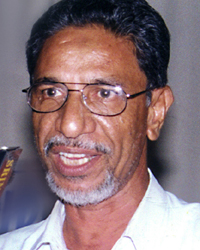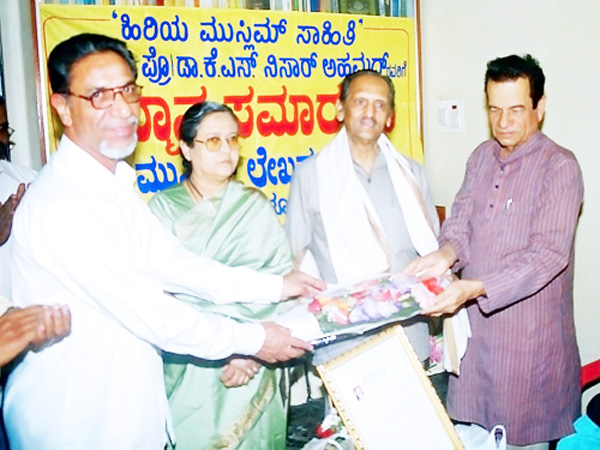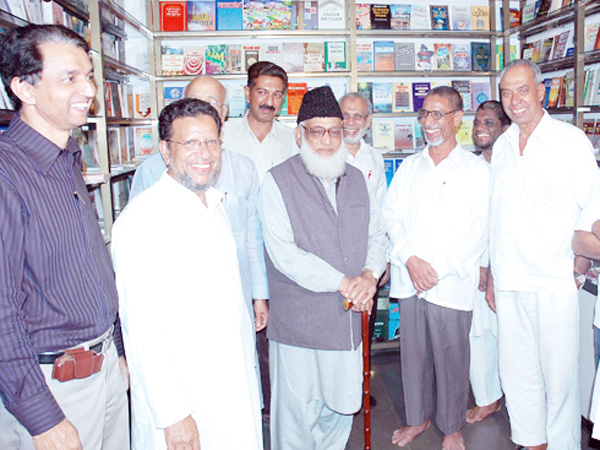
He personified humility, modesty, patience and compassion. He earned respect for his sincerity, simple living and utmost dedication towards the religious reformation in the community. Being his niece, I have grown up seeing my chacha help the needy, educate the poor and adopt a holistic approach in solving problems within the family. He had a sharp sense of humour which made him blend among the people of all ages.
Chacha was a propagator of women’s empowerment. He always encouraged girls to take part in all activities along with men. As a result we can see a vibrant women’s wing of Jamate Islami Hind indulging enthusiastically in religious and social activities in coastal Karnataka.
Endowed with extraordinary intelligence, he was also an enchanting orator who was gifted with eloquence in Kannada, Urdu and English languages. His speeches inspired masses and changed the life of many all over Karnataka. He was one among the very few people in the Beary community who had extraordinary eloquence in Urdu. His urdu speeches that he delivered during his tours of the Gulf countries are still revered and remembered in this region.
Chacha brought about a revolution in the field of Islamic literature in Kannada language by being instrumental in publishing Sanmarga, a Kannada weekly. Thereby making the knowledge of Islam and current affairs in the Islamic world widespread among the Muslims in Karnataka. He has penned about 22 books on different subjects and has to his credit the translation of about 25 books from Urdu and English to Kannada language. His landmark contribution to the Islamic literature is ‘Tappu Kalpanegalu’ (Misunderstandings) which wiped away enormous misunderstandings about Islam. Besides, this work was applauded beyond Karnataka when it was translated to the languages of the neighbouring states. He also took a lead in bringing about communal harmony among the followers of various religions through his writings and speeches. His book on the biography of Prophet Muhammad(pbuh), Pravadi Jeevana Sandesha is truly a work of an intellectual mind.

Ibrahim Sayeed with the ex-Khazi of Mangalore Kota Abdul Khader Musliyar during the launch of Madhyamam in Mangalore
He served relentlessly in the field of Dawah (propagation of religion) by being an active member of Jamate Islami Hind. He served the organization as the member of its National advisory board and also adorned the position of state president of the Karnataka and Goa zone.
This noble soul was an epitome of the saying “simple living high thinking”. His life in this world was far away from luxuries and he never got trapped in the usual worldly matters. He lived the teaching of Prophet Muhammad, "Live in this world as though you are a stranger or a traveler”. He proved that when spirituality increases, one tends to think about higher things and shuns mundane issues. Although he contributed greatly to the Kannada literature no award was lucky enough to adorn his personality. He did not leave any worldly wealth behind, but has definitely carried along with him the three treasures of the hereafter that is: Recurrent charity, Knowledge by which people derived benefit and Righteous children who supplicate for him.

Ibrahim Sayeed felicitating noted Kannadda writer K.S. Nisar Ahamed
It is needless to say that his death also left lessons for all of us to ponder upon. When he learnt about the deadly disease that attacked him he did not feel miserable and helpless. Instead he was greatly concerned about accomplishing all pending assignments that were on his way. He consoled his dear ones and strengthened them to face the loss of his absence.
Chacha started his career as a banker. If he had continued with it he would have retired as a senior banker and would earn a lot in terms of worldly benefits. But he chose to quit the job and dedicate himself in the service of mankind because of which he will live in the hearts of people forever.
Great men leave a legacy behind. It would not be an exaggeration if I say that my chacha left behind a legacy that will be remembered for generations to come. I have always heard the saying that great men do ordinary things in an extraordinary way. But here is a great man who did extraordinary things in an ordinary and simple way.
His demise is a loss of a legend of this era and has created a void that is difficult to fill in the near future. May his soul rest in eternal peace and may the Almighty place him in the highest position of Paradise.

Ibrahim Sayeed with former Jamaate Islami Hind president Maulana Sirajul Hasan and other dignitaries during the opening of the new book stall at Hidayath Centre,This was one of the last public programmes attended by Sayeed saab.
Photos by Ahmed Anwar








Comments
Add new comment